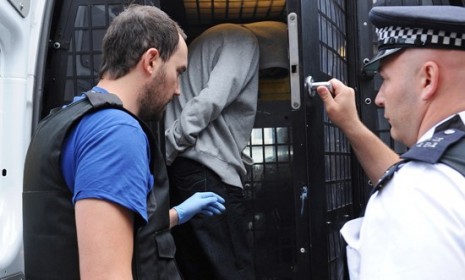Using Facebook to incite London riots: Is a 4-year sentence too harsh?
Two Facebook users in their 20s used the network to promote debauchery as if it were a social event — and they're paying a surprisingly steep price

A free daily email with the biggest news stories of the day – and the best features from TheWeek.com
You are now subscribed
Your newsletter sign-up was successful
Swept up in the London riots last week, 20-year-old Jordan Blackman created a Facebook event advertising "massive Northwich lootin'" at a specific date, time, and location. Nobody showed up. A tipsy Perry Sutcliffe-Keenan, 22, posted a similar message, but removed his post from Facebook the next day. Even though their Facebook activity provoked no actual crimes or riots, both men were arrested and have just been handed four-year jail sentences for using the social-media site to "organize and orchestrate" disorder. That's the harshest penalty yet in the post-riot aftermath, part of the "tough message" British Prime Minister David Cameron says he wants to send his country. Too tough in this case?
Things are getting out of hand…again: "Toughness is fine," says William Underhill at The Daily Beast. "But only when tempered with good sense." The sentencing of Blackshaw and Sutcliffe-Keenan follows other instances of overkill: A 23-year-old sentenced to six months in jail for thieving a $6 water bottle, and five months for a mother caught wearing a pair of shorts her flatmate had stolen. There's a "rising danger of wild inconsistency" when courts do away with sentencing guidelines. Certainly, the "crazy crackdown" won't go down well with angry Brits.
"London riots: Britain's crazy crackdown on young protesters"
The Week
Escape your echo chamber. Get the facts behind the news, plus analysis from multiple perspectives.

Sign up for The Week's Free Newsletters
From our morning news briefing to a weekly Good News Newsletter, get the best of The Week delivered directly to your inbox.
From our morning news briefing to a weekly Good News Newsletter, get the best of The Week delivered directly to your inbox.
And this may not even be a deterrent: A four-year sentence in England typically accompanies a conviction for kidnapping, killing somebody while drunk driving, or sexual assault, says Alan Travis at The Guardian. In 2005, a rioter charged with "violent disorder" received only three years — and unlike these two cases, his riot actually happened. Worse, the overly severe sentence may not actually deter other people from doing the same thing. "There is real doubt about whether many potential criminals know the 'going rate' for any particular crime — let alone whether they are deterred by it."
"England riots: Will harsher sentences act as a deterrent?"
Actually, the punishment fits the crime: The sentences are not disproportionate, says Janet Daley at The Telegraph. "If ever there was a time to bypass the usual rules of proportionality in the criminal justice system, this is it." The four-year sentences are in line with a message that is "simply imperative" as the country reels from the riots: "This must never happen again." If harsher-than-usual punishments is the method of ensuring that's the case, then "it would be irresponsible" to do anything less.
"Riot sentences are not 'disproportionate'"
A free daily email with the biggest news stories of the day – and the best features from TheWeek.com
-
 Political cartoons for February 7
Political cartoons for February 7Cartoons Saturday’s political cartoons include an earthquake warning, Washington Post Mortem, and more
-
 5 cinematic cartoons about Bezos betting big on 'Melania'
5 cinematic cartoons about Bezos betting big on 'Melania'Cartoons Artists take on a girlboss, a fetching newspaper, and more
-
 The fall of the generals: China’s military purge
The fall of the generals: China’s military purgeIn the Spotlight Xi Jinping’s extraordinary removal of senior general proves that no-one is safe from anti-corruption drive that has investigated millions